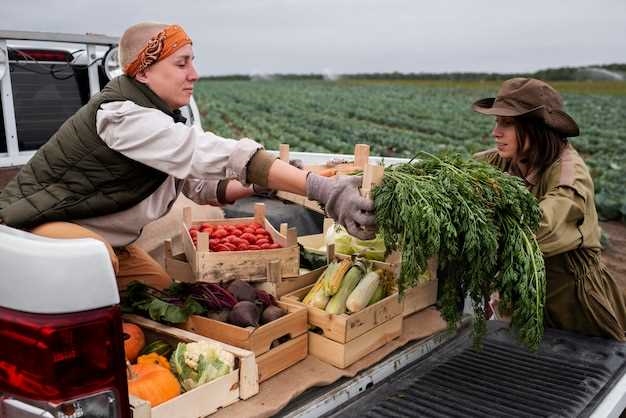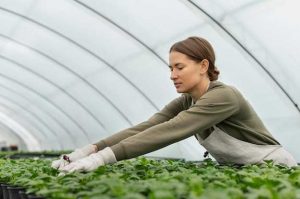

In today’s globalized world, where economic disparities and food insecurity continue to persist, it is crucial to focus on empowering those who play a vital role in our society – the rural producers. These unsung heroes, often referred to as small-scale farmers, are the backbone of our agricultural systems, working tirelessly to feed the world’s growing population. However, they face numerous challenges that hinder their economic development and threaten food security.
Recognizing the significance of empowering rural producers, various initiatives have been implemented to address their needs and enhance their livelihoods. These initiatives aim to provide them with the necessary tools, resources, and knowledge to overcome the barriers they face, enabling them to thrive in an ever-changing agricultural landscape.
One such initiative focuses on fostering sustainable agricultural practices that promote both economic growth and environmental conservation. By encouraging the adoption of innovative techniques, such as organic farming and agroforestry, rural producers can improve their productivity while minimizing the negative impact on natural resources. This not only ensures the long-term viability of their livelihoods but also contributes to the overall goal of achieving food sovereignty.
Another crucial aspect of empowering rural producers is enhancing their access to markets and value chains. Often marginalized and excluded from mainstream markets, small-scale farmers struggle to receive fair prices for their produce. To address this issue, initiatives have been launched to strengthen their bargaining power and facilitate their integration into local and international markets. By establishing direct links between producers and consumers, these initiatives enable farmers to receive a fair share of the value generated along the supply chain, thereby improving their income and economic stability.
Enhancing Access to Financial Services for Smallholder Farmers
Improving the availability and accessibility of financial services is crucial for the economic empowerment and food security of small-scale farmers. This section explores various strategies and approaches aimed at enhancing the access to financial services for individuals engaged in small-scale farming activities.
One key aspect of empowering smallholder farmers is ensuring they have access to affordable credit and loans. Access to credit enables farmers to invest in improved agricultural practices, purchase necessary inputs such as seeds and fertilizers, and expand their farming operations. By facilitating access to credit, financial institutions can play a vital role in supporting the growth and development of smallholder farmers.
Another important aspect is the provision of savings and insurance services tailored to the specific needs of smallholder farmers. Savings accounts allow farmers to set aside funds for future investments or emergencies, while insurance products provide protection against various risks such as crop failure, natural disasters, or livestock diseases. These financial tools not only help farmers manage risks but also encourage long-term planning and stability in their farming activities.
Furthermore, promoting financial literacy and education among smallholder farmers is essential for enhancing their access to financial services. Many farmers may lack the necessary knowledge and skills to effectively navigate the financial system and make informed decisions. By providing training and educational programs, farmers can gain a better understanding of financial concepts, improve their financial management skills, and make more informed choices regarding their financial needs.
In addition to traditional financial institutions, innovative digital solutions can also play a significant role in enhancing access to financial services for smallholder farmers. Mobile banking, for example, allows farmers to conduct financial transactions, access credit, and make payments using their mobile phones. This technology can overcome geographical barriers and reach farmers in remote areas, providing them with convenient and efficient financial services.
In conclusion, enhancing access to financial services for smallholder farmers is crucial for their economic development and food security. By ensuring affordable credit, tailored savings and insurance products, promoting financial literacy, and leveraging digital solutions, we can empower smallholder farmers and enable them to thrive in their agricultural pursuits.
Promoting Sustainable Agricultural Practices for Smallholder Farmers
In this section, we will explore the importance of implementing sustainable agricultural practices to support the growth and development of small-scale farmers. By adopting environmentally-friendly and socially responsible approaches, these farmers can enhance their productivity, reduce their environmental impact, and contribute to the overall sustainability of the agricultural sector.
Enhancing Productivity through Sustainable Practices

Implementing sustainable agricultural practices can significantly improve the productivity of smallholder farmers. By utilizing organic fertilizers, crop rotation, and integrated pest management techniques, farmers can enhance soil fertility, reduce pest infestations, and minimize the need for chemical inputs. This not only improves crop yields but also ensures the long-term health and viability of the land, enabling farmers to continue their agricultural activities for generations to come.
Promoting Environmental Stewardship and Conservation
Sustainable agricultural practices also play a crucial role in promoting environmental stewardship and conservation. By minimizing the use of synthetic fertilizers and pesticides, smallholder farmers can prevent soil degradation, water pollution, and biodiversity loss. Additionally, adopting agroforestry techniques and promoting the use of renewable energy sources can contribute to climate change mitigation and adaptation, further enhancing the resilience of small-scale farming systems.
By embracing sustainable agricultural practices, smallholder farmers can not only improve their own livelihoods but also contribute to the achievement of global sustainability goals. These practices not only ensure the economic viability of small-scale farming but also safeguard the environment and promote food security for present and future generations.
Strengthening Market Linkages for Smallholder Farmers
Enhancing connections between small-scale agricultural producers and markets is crucial for their economic growth and food security. This section explores strategies and approaches aimed at improving market linkages for individuals engaged in small-scale farming. By establishing stronger connections between farmers and markets, we can foster sustainable development and ensure a steady income for these individuals.
Creating Access to Market Information
One key aspect of strengthening market linkages for smallholder farmers is providing them with access to reliable and up-to-date market information. By equipping farmers with knowledge about market trends, prices, and demand, they can make informed decisions regarding crop selection, production volumes, and timing of sales. This information empowers farmers to negotiate better prices and plan their farming activities more effectively, ultimately leading to increased profitability and improved livelihoods.
Facilitating Market Connections
Another important strategy is facilitating direct connections between smallholder farmers and buyers, such as local businesses, cooperatives, or even larger-scale distributors. By establishing these connections, farmers can bypass intermediaries and negotiate fair prices for their produce. This not only increases their income but also strengthens their bargaining power within the market. Additionally, establishing long-term relationships with buyers can provide smallholder farmers with a stable market for their products, reducing the risks associated with fluctuating market conditions.
In conclusion, strengthening market linkages for smallholder farmers is essential for their economic development and food security. By providing access to market information and facilitating direct connections with buyers, we can empower these individuals to thrive in the agricultural sector, contributing to their own well-being and the overall sustainable development of their communities.
Improving Access to Technology and Innovation for Smallholder Farmers
Enhancing the availability and utilization of cutting-edge technology and innovative solutions is crucial for the advancement and prosperity of small-scale agricultural producers. By facilitating access to these tools, we can empower farmers to overcome challenges, increase productivity, and achieve sustainable development.
One key aspect of improving access to technology is ensuring affordability. Many smallholder farmers face financial constraints, making it difficult for them to invest in expensive equipment or digital solutions. Therefore, it is essential to develop cost-effective technologies that are tailored to the specific needs and resources of small-scale farmers.
Another important factor is providing training and capacity-building programs to enhance farmers’ skills and knowledge in utilizing technology. By offering workshops, demonstrations, and educational resources, we can equip farmers with the necessary expertise to effectively adopt and integrate innovative solutions into their farming practices.
Collaboration and partnerships between different stakeholders, such as governments, NGOs, and private sector entities, are also vital in improving access to technology. By working together, these actors can pool resources, share expertise, and develop comprehensive strategies to address the technological needs of smallholder farmers.
Furthermore, the establishment of information-sharing platforms and networks can play a significant role in enhancing access to technology and innovation. These platforms can serve as a hub for farmers to exchange knowledge, experiences, and best practices, fostering a supportive community that promotes the adoption and diffusion of technological advancements.
Lastly, policymakers should prioritize the development and implementation of supportive policies and regulations that facilitate the adoption and diffusion of technology among smallholder farmers. This includes measures such as tax incentives, subsidies, and streamlined procedures for accessing funding and resources.
| Benefits of Improving Access to Technology and Innovation |
|---|
| 1. Increased productivity and efficiency |
| 2. Enhanced resilience to climate change and other external shocks |
| 3. Improved market access and competitiveness |
| 4. Reduction in post-harvest losses |
| 5. Empowerment of women and youth in agriculture |
Building Capacity and Providing Training for Smallholder Farmers
Enhancing the skills and knowledge of individuals engaged in small-scale agriculture is crucial for their success and the overall development of the agricultural sector. This section focuses on the importance of building capacity and providing training programs specifically tailored for smallholder farmers.
Capacity building initiatives aim to equip smallholder farmers with the necessary skills, knowledge, and resources to improve their agricultural practices, increase productivity, and enhance their overall livelihoods. These initiatives encompass a wide range of activities, including training programs, workshops, and knowledge-sharing platforms.
Training programs play a vital role in empowering smallholder farmers by providing them with technical know-how and practical skills. These programs cover various aspects of agriculture, such as sustainable farming techniques, crop management, pest control, soil conservation, and post-harvest handling. By acquiring these skills, farmers can optimize their production, reduce losses, and improve the quality of their crops.
Furthermore, capacity building initiatives also focus on enhancing farmers’ understanding of market dynamics, value chain management, and access to finance. By equipping smallholder farmers with business and marketing skills, they are better positioned to negotiate fair prices for their produce, establish market linkages, and explore value-added opportunities. Additionally, training programs can educate farmers on financial management, enabling them to make informed decisions and access credit facilities to invest in their farming enterprises.
Collaboration between government agencies, non-governmental organizations, and agricultural institutions is crucial in implementing effective capacity building and training programs for smallholder farmers. These partnerships can leverage expertise, resources, and networks to develop comprehensive training modules, establish demonstration farms, and facilitate knowledge exchange among farmers.
| Benefits of Capacity Building and Training for Smallholder Farmers |
|---|
| 1. Improved agricultural practices and productivity |
| 2. Enhanced income generation and livelihoods |
| 3. Increased resilience to climate change and other challenges |
| 4. Access to markets and value-added opportunities |
| 5. Empowerment and self-reliance |
In conclusion, building capacity and providing training programs tailored for smallholder farmers are essential components of initiatives aimed at empowering individuals engaged in small-scale agriculture. By equipping farmers with the necessary skills, knowledge, and resources, these initiatives contribute to the sustainable development of the agricultural sector, enhance food security, and improve the overall well-being of smallholder farmers and their communities.
Supporting Policy and Advocacy for Smallholder Farmers
In this section, we will explore the importance of supporting policy and advocacy efforts aimed at improving the livelihoods of small-scale farmers. By advocating for policies that address the unique challenges faced by smallholder farmers, we can create an enabling environment for their economic growth and food security.
1. Policy Reforms
One crucial aspect of supporting smallholder farmers is advocating for policy reforms that prioritize their needs. This involves working with governments and policymakers to develop and implement policies that address issues such as access to land, credit, and markets. By advocating for fair and inclusive policies, we can ensure that smallholder farmers have equal opportunities to thrive and contribute to the overall agricultural sector.
2. Capacity Building
Supporting policy and advocacy for smallholder farmers also involves capacity building initiatives. This includes providing training and resources to farmers, farmer organizations, and other stakeholders to enhance their understanding of policy processes and their ability to engage in advocacy efforts. By empowering smallholder farmers with knowledge and skills, we can strengthen their voices and enable them to actively participate in shaping policies that affect their livelihoods.
- Organizing workshops and training sessions on policy analysis and advocacy strategies
- Facilitating networking and collaboration among smallholder farmer organizations
- Providing access to information and resources related to policy development and implementation
3. Awareness and Communication
Creating awareness and fostering effective communication channels are essential in supporting policy and advocacy for smallholder farmers. This involves raising public awareness about the importance of smallholder agriculture and the challenges faced by farmers. It also includes facilitating dialogue and information exchange between farmers, policymakers, and other stakeholders to ensure that the voices of smallholder farmers are heard and their perspectives are considered in policy-making processes.
- Conducting campaigns and public outreach programs to highlight the contributions of smallholder farmers
- Engaging in policy dialogues and consultations to provide input from smallholder farmers’ perspectives
- Utilizing various communication platforms, such as social media and community radio, to disseminate information and promote advocacy efforts
By supporting policy and advocacy for smallholder farmers, we can create an enabling environment that empowers them to overcome challenges, improve their livelihoods, and contribute to sustainable economic development and food security.





